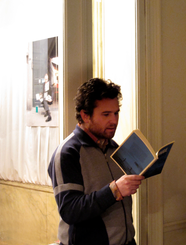 Jacob Wren Jacob WrenPhoto by Brancolia JACOB WREN is a writer and maker of eccentric performances. His books include: Unrehearsed Beauty, Families Are Formed Through Copulation and Revenge Fantasies of the Politically Dispossessed. As co-artistic director of Montreal-based interdisciplinary group PME-ART he has co-created the performances: En français comme en anglais, it's easy to criticize (1998), the HOSPITALITÉ / HOSPITALITY series including Individualism Was A Mistake (2008) and The DJ Who Gave Too Much Information (2011) and Every Song I’ve Ever Written (2012). He travels internationally with alarming frequency and frequently writes about contemporary art. RUSTY TALK WITH JACOB WREN Kathryn Mockler: What is your first memory of writing creatively or being creative? Jacob Wren: I don’t know if I have a first memory. But I do know around age thirteen I started suffering from terrible insomnia. Some nights I didn’t sleep at all, while most nights I slept very little. And basically I just filled the endless, sleepless nights with reading and writing, for more or less ten years, until I realized that the simple cure for my insomnia was rigorous physical exercise. Still, to this day, I associate writing with the strange, hallucinatory state that comes from having barely slept for weeks on end, as a kind of unreal trance, almost like a dream. It was during those nights, lying awake, almost too tired to move, that I first trained myself to write. KM: Why did you become an artist/writer and what keeps you going? JW: To be honest, the only thing that has ever really interested me was art (in all its many forms.) I wish I could become interested in something else, since I feel, as a human being, at times this overemphasis on artistic interests makes me a bit narrow, as well as making my interactions with other people often rather difficult. (I mean, I do my best.) At the same time, I find it very hard to maintain any interest in art and often don’t know exactly what keeps me going (except that I have no idea what else I could possibly do). Sometimes I remind myself a bit of this apocryphal story of a Russian who moved to New York but never learned English. Gradually, over the course of his life, he forgot how to speak Russian, yet still never learned English, so in the end he spoke no language at all. Gradually I am becoming less and less interested in art, while not really becoming interested in anything else, so in the end I’m kind of nowhere. Like a priest who has lost faith. But that makes it all sound more dire than it actually is. Still, I think it’s important that we talk about these things, since hardly anyone ever does. I have often said that I don’t particularly relate to people who make performance, or write, or make art, but I do relate to people who make performance / writing / art who think about quitting every fifteen seconds. Those are really my people. I call us the ‘boy who cried wolf set’. Because, for me, if you really look at art today, at what it means, at who it reaches, at what is considered successful or important, it often seems like a complete waste of time. If I had any talent for it, or drive towards it, I would definitely quit art and become an activist, since the world’s problems are now so overwhelming, immediate and tragic. But, for better or worse, I can’t seem to get myself to do anything else: all I can really do is write. (Well, I also make performances, but that becomes harder and harder as the years roll on.) KM: How would you describe your writing process? How does your blog A Radical Cut in the Texture of Reality fit into this process? JW: I mainly feel like I don’t really have a process. I just have ideas and write them down to the best of my ability. Often I try to write every morning, but then, at other times, I am stuck for months on end and write very little. I usually do a first draft in a notebook, and then type it up as I go. Sometimes there is a little bit of re-writing as I type it into the computer, but mainly the second draft just allows me to think more about what I’m doing. I definitely started my blog, in 2005, because I had almost completely stopped writing and was looking for a way to start again. It’s always been difficult for me to get published—I suppose what I write doesn’t quite fit anywhere (maybe it’s a little bit easier now, I’m not sure)—but at the time being able to just post what I was writing on my blog, as I went along, gave me more of a feeling that I was actually doing something. I would tell myself: just write one paragraph and post it, then at least you will have written one paragraph. It kind of made me feel like writing was possible again, after having felt it was basically impossible for many years. (Mainly due to too many rejection letters, or more precisely to the fact that I’m a little bit too sensitive to such things.) Now my blog gets about 2,000 hits a month, so that must mean someone is reading it, but I don’t really have any sense of who is reading it, why, or what they think. There are hardly any comments. I spend so much time on the internet (mainly on Facebook and listening to music), and I know this has deeply affected how I think about art, about writing, and also how I practice it. It is difficult for me to really analyze what this change might be, it has all been so natural and intuitive, but I know there is something about the shuffle feature on iTunes, and about the seeming randomness as one clicks from one link to the next, that has been completely folded into my aesthetic. KM: What or who influences your writing? JW: I keep an ongoing list of favourite books: Some Favourite Books And recently I have added a list of visual artists: List of Artists But mainly I just want to devour everything. I want to have an overview. I want to know what is happening in art today, and everything that has ever happened in art before, and I want to use all of it while at the same time making it my own. I want to speak about the world, about the world today and about history, about ideas, thinking, philosophy, theory, and about my own subjective experiences. I want to struggle with it, admit to failure, be upset that I am not as good as the artists and authors I love but keep trying. I wish the mainstream was more open and more interesting. KM: Can you discuss the relationship between writer and reader or audience? Who would be your ideal reader? I’m interested also in terms of your blog and its readership. Does that audience inform your work in any way? JW: I have a sort of double life, half writing, the other half performing. When you perform the audience is right there in front of you, and all of my performance work is about trying to honestly deal with the fact that the audience is right there in front of me, about the paradox of trying to be yourself in the deeply unnatural situation of a room full of strangers watching you. I’ve always like the Gertrude Stein quote: “I write for myself and strangers.” When I was revising my last book, I showed it to a bunch of friends for comments, and I listened to all of their comments, and later, when the book came out, realized I had completely ignored basically all of their suggestions. I had asked for their help, and then completely ignored everything they said. (Well, I’ve always been stubborn.) And I feel this is so often the way between me and readers, I listen to every comment I get, think about it, try to take it in, fully absorb it, but never directly respond to anything anyone says. Nonetheless, I very much hope it is all in there anyway, somewhere in my head, affecting what I think, how I see what I’m doing, in some completely indirect way making the work better. KM: What is the best piece of literary advice you’ve gotten that you actually use? JW: As I’ve already suggested, I’m so bad with taking advice. But I really liked reading what Alain Badiou once said in an interview. He said the only rule for activism is: keep going. And I guess that’s mainly what I try to do now, keep going, which also means not making too many compromises, trying to offer up something different enough from everything else out there, trying to see the world a different way and put it into words. But, then again, I also constantly want to quit. Which is maybe why the advice is so important. Keep going. KM: What is your favourite or funniest literary moment, if you have one? JW: I actually can’t think of anything at the moment. Hopefully that means there are many favourite, hilarious literary moments to come. Maybe the future will be full of them. KM: What are you reading at the moment? JW: I just started reading The Empire Within: Postcolonial Thought and Political Activism in Sixties Montreal by Sean Mills. I believe I must be reading it because I live in Montreal. So far it’s fascinating. KM: What projects are you working on in 2013? JW: I am writing a new book entitled Polyamorous Love Song. Here is a short synopsis: It is a book of many different narrative through-lines. For example: 1) A mysterious group, known as The Mascot Front, who wear furry mascot costumes at all times and are fighting a revolutionary war for their right to wear furry mascot costumes at all times. 2) A movement known as the ‘New Filmmaking’ in which, instead of shooting and editing a film, one simply does all of the things that would have been in the film, but in real life. This movement has many adherents. Its founder is known only as Filmmaker A. 3) A group of ‘New Filmmakers’, calling themselves The Centre for Productive Compromise, who devise increasingly strange sexual scenarios with complete strangers. They invent a drug that allows them to intuit the cell phone number of anyone they see, allowing phone calls to be the first stage of their spontaneous, yet somehow carefully scripted, seductions. 4) A secret society that concocts a sexually transmitted virus that infects only those on the political right. They stage large-scale orgies, creating unexpected intimacies and connections between individuals who are otherwise savagely opposed to one another. 5) A radical leftist who catches this virus, forcing her to question the depth of her considerable leftist credentials. 6) A German barber in New York who, out of scorn for the stupidity of his American clients, gives them avant-garde haircuts, unintentionally achieving acclaim among the bohemian set who consider his haircuts to be strange works of art. And yet each of these stories is only the beginning. And we are also beginning a new, ongoing internet/performance project entitled Every Song I’ve Ever Written. Here is a description: From 1985 to 2004 Jacob Wren wrote songs. Lots and lots of songs. At the time not very many people heard them. Every Song I’ve Ever Written is a project about memory, history, things that may or may not exist, songwriting, the internet and pop culture. On the website everysongiveeverwritten.com you can listen to, and download, these songs. In a way, because hardly anyone heard them, these songs don’t yet exist. If you are reading this, we would like you to consider recording your own version of one of these songs, changing it, making it your own, then sending it to us. We will post every version we receive. There will also be performances and events. Solo performances will feature Jacob performing all of the songs in chronological order (it takes about five hours.) Band Nights will feature a series of local bands in different cities performing one of Jacob’s songs each. After each version, Jacob will interview the band about what it was like to cover the song, and the band will interview Jacob about what it was like to write it. We are not doing this because we think these are the best songs ever (we hope at least a few of them are good.) We are doing this because hardly anyone heard them at the time, and we are wondering if there is some new, strange way to bring them out into the world. In doing so we hope to raise a few questions about what songs mean on the internet, about what songwriting is actually like today, and also take a sidelong glance back at the recent past. LINKS Radical Cut in the Texture of Reality Every Song I've Ever Written PME-ART Tumblr Goodreads Le Quartanier 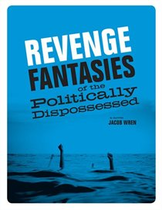 REVENGE FANTASIES OF THE POLITICALLY DISPOSSESSED Pedlar Press, 2010 Description from Pedlar Press: Set in a dystopian near-future, Revenge Fantasies of the Politically Dispossessed is a novel - a kind of post-capitalist soap opera - about a group of people who regularly attend ''the meetings.'' At the meetings they have agreed to talk, and only talk, about how to re-ignite the left, for fear if they were to do more, if they were to actually engage in real acts of resistance or activism, they would be arrested, imprisoned, or worse. Revenge Fantasies is a book about community. It is also a book about fear. Characters leave the meetings and we follow them out into their lives. The characters we see most frequently are the Doctor, the Writer and the Third Wheel. As the book progresses we see these characters, and others, disengage and re-engage with questions the meetings have brought into their lives. The Doctor ends up running a reality television show about political activism. The Third Wheel ends up in an unnamed Latin American country, trying to make things better but possibly making them worse. The Writer ends up in jail for writing a book that suggests it is politically emancipatory for teachers to sleep with their students. And throughout all of this the meetings continue: aimless, thoughtful, disturbing, trying to keep a feeling of hope and potential alive in what begin to look like increasingly dark times. Revenge Fantasies asks us to think about why so many of us today, even those with a genuine interest in political questions, feel so deeply powerless to change and affect the world that surrounds us, suggesting that, even within such feelings of relative powerlessness, there can still be energizing surges of emancipation and action 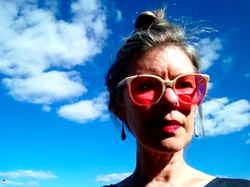 Lisa Robertson For many years LISA ROBERTSON has worked across disciplines and often in collaboration. With the late Stacy Doris she was the Perfume Recordist, an ongoing sound performance and writing project with work in the new I'll Drown My Book: Conceptual Writing by Women. She worked as The Office for Soft Architecture, publishing reports, essays, walks and manifestoes as well as curating and cooking as OSA. Currently she is translating the French linguists Emile Benveniste and Henri Meschonnic with Avra Spector. Her most recent book of poetry is R's Boat, from University of California Press, and Bookthug published a new book of essays, Nilling, in spring 2012. She lives in rural France, and teaches at Piet Zwart Institute in Rotterdam. RUSTY TALK WITH LISA ROBERTSON Kathryn Mockler: What is your first memory of writing creatively or being creative? Lisa Robertson: I think my earliest creative acts were acts of deception and truth bending—petty theft, rebuttal, cover-up. This led directly to writing. KM: Could you describe your writing process? (For example, do you write every day? When? Where? How do you approach revision, etc.) LR: Everyday I sit in an armchair and write in a notebook as I read. If somebody gives me resources I leave the armchair and travel to read in an exotic library. Writing on trains and airplanes on the way to and from these libraries is a special pleasure, because so much anticipation and repletion is involved. Talking to my friends usually shows me how to work with the material I have gathered. My dearest friends are the ones I simply obey. KM: How would you define experimental writing? LR: I wouldn't define experimental writing. It would cease to be experimental then. KM: What influences your work? LR: Unanswerable questions. Unanswerable to me that is. Right now I am trying to understand the movement a triangle sections, and I am trying to understand the humoural system of medicine. Put more simply, desire influences my work. KM: What have you read recently that excites you? LR: I just spent a month reading at the Warburg Institute in London, for 6-8 hours a day, six days a week. Everything excited me. I was reading about the relationships between geometry, astronomy, optics, and medicine in the ancient world, until the baroque era and Johannes Kepler's work on the elliptical orbits. I wanted to understand the dynamics of the ellipse, and I wanted to understand science as a relational query into the structure of the cosmos, rather than a recitation of the mechanics of cause and effect. Plato's Timeaus is hallucinogenic in that respect. So is Kepler's The Six-Sided Snowflake. So is medieval Arabic optics. These studies are enticing me to draw more, and that is a pleasure. In terms of recent poetry—Erin Moure's translations of Galician poet Chus Pato, Aisha Sasha John's new work, Angela Carr, the American poet Chris Nealon, and Francis Ponge. I read Ponge as a contemporary. KM: What is the best piece of writing advice you've heard or been given that you actually use? LR: Writing is the good use of boredom. I try to have a boring life. I don't socialize, and I eat nine servings of vegetables a day. KM: Your funniest or favourite literary moment, if you have one. LR: When Jam Ismael read at KSW in 2002 she sat a tape recorder on a windowsill and played a cassette recording of New Delhi crows. Vancouver crows came to the open window to listen and respond. Every emotion cracked open at once. KM: What are you working on now? LR: I am simply reading and learning, and making the occasional paragraph or drawing as record and exploration. 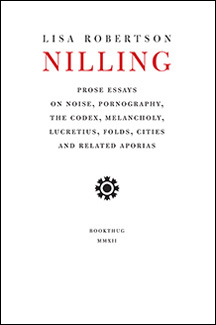 LISA ROBERTSON'S MOST RECENT BOOK Nilling, Bookthug, 2012 Description from the publisher: Nilling: Prose is a sequence of 6 loosely linked prose essays about noise, pornography, the codex, melancholy, Lucretius, folds, cities and related aporias: in short, these are essays on reading. Excerpts from Nilling: EXCERPT 1 I have tried to make a sketch or a model in several dimensions of the potency of Arendt's idea of invisibility, the necessary inconspicuousness of thinking and reading, and the ambivalently joyous and knotted agency to be found there. Just beneath the surface of the phonemes, a gendered name rhythmically explodes into a founding variousness. And then the strictures of the text assert again themselves. I want to claim for this inconspicuousness a transformational agency that runs counter to the teleology of readerly intention. Syllables might call to gods who do and don't exist. That is, they appear in the text's absences and densities as a motile graphic and phonemic force that abnegates its own necessity. Overwhelmingly in my submission to reading's supple snare, I feel love. EXCERPT 2 In the facsimile Oblongus Codex, at the bottom margin on the page containing lines 1140-1159 of the fourth book of De rerum natura, I saw what at first appeared to be the photographed image of a small oval hole about the size and shape of my thumbnail, tidily cut from the vellum of the original. Bordering this ellipse, I saw a faint drawing that added a labial ornamental border around the shape. It seemed that some sort of monkish pornographic doodle had been censored. At closer examination I realized that the elliptical absence had in fact not been cut from the page by some historical censor--it was rather a flaw inherent in the structure of the vellum; the trace of a wound perhaps. Several of these photographed images of material mise-en-abimes appeared as I leafed through the codex. In each case the page was cut from the larger skin so that the scar found its place in a margin, so as not to interfere with the scribe’s work. But here in book four, the scribe had decorated the flaw in the skin with this mildly and endearingly erotic doodle. The tiny absence was animated: a lacework. RUSTY TALK WITH PENN KEMP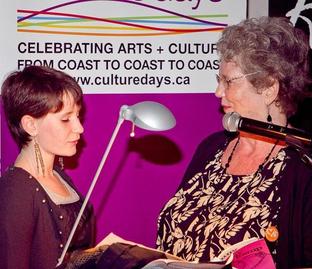 Penn Kemp Penn KempPhoto by Wendy Saby London, Ontario performance poet, activist and playwright Penn Kemp is the 40th Life Member of the League of Canadian Poets. This year she received the Queen Elizabeth 11 Diamond Jubilee medal for service to the arts. Penn has published twenty-five books of poetry and drama, had six plays and ten CDs produced as well as Canada’s first poetry CD-ROM and several award-winning videopoems. As the inaugural Poet Laureate for the City of London, she initiated and judged Poetry in Motion and the National Haiku Competition. As Canada Council Writer-in-Residence for University of Western Ontario for 2009-10, her project was the DVD, Luminous Entrance: a Sound Opera for Climate Change, Pendas Productions. Kathryn Mockler: What is your first memory of writing creatively? Penn Kemp: I remember my own early discovery of and delight in language. As a child, I did not coddle my dolls. I sat them up and read the poems, stories and nursery rhymes my mother had read to me. The words she read would sink into the well of my hearing and become part of me; their rhythms would dance inside my body like northern lights. I ate up those words with a necessity as strong as hunger. Even at first hearing, the words were somehow familiar as if I recognized in them old friends. I remember swelling proudly with the power of words, in learning first to read and then actually to write, to put down the letters so that they made sense to anyone who could read. I wrote my first poem when I was six, excited and amazed at having created through apparent magic something out of nothing with marks on a page accompanied by a drawing of kids skating. I glimpsed a world in which words had a life of their own, just as toys did. I knew that if I could wake at the right time at night I would catch my toys at play. So too, I felt words could be surprised and brought to life on the page. Writing that first poem was the first time that I recall consciously feeling that I was doing an adult thing creating something entirely on my own, assuming independence growing up! I felt like the Little Red Hen in the nursery story: "‘I can do it myself,’ said The Little Red Hen, and she did." KM: What keeps you going as a poet or why do you write? PK: When I write, I begin an adventure equipped with my writing tools and everything else I know about myself and the world. By the end of the day, everything I knew and thought may be transformed or discarded. It intrigues me that what I know and start off with is the very means for realizing what is unknown. I write to articulate the moment, to puzzle out feelings or incidents I can't figure out. The best poems come, though, when I follow the language of a striking phrase. Sound leads me. KM: Could you describe your writing process? (For example, do you write every day? When? Where? How do you approach revision, etc.) PK: I write every day, in the morning, in the little room that was my childhood bedroom. It looks out on a small greenhouse, a source of inspiration and delight all year. The green throughout the winter keeps me from getting restless and hungry for sun. Often in the morning as I transcribe dreams, they become poems. They're not usually very good poems so they don't see the light of day beyond a file in my computer, but they keep the energy of poetry flowing. The problem I have with them is that they are too narrative and I feel I need to stick to the literal story line that the dream gave me. I revise constantly, even when I am performing, pencil often in hand. Reading the poem in front of an audience allows me to really hear what works...and what does not. My first book, Bearing Down, was performed in four voices for a Seattle FM radio show in 1973. That performance opened up the door to possibilities for the spoken word in those early days. I've been lifting the word off the page any way I could since then, most recently in videopoems. But the ear remains my first love. Concentrating on the voice rather than gesture or physical presence in communicating poetry has taught me to listen acutely, and that's had an effect not just on my sound poetry but on all my work. Collaborating with artists of different disciplines is exciting and energizing. And with the Cloud, friends and fans can hear the work in Brazil, in India, in Britain simultaneously!” KM; What writers were influential to you when you first started out? And what poets are you reading now? PK: Victor Coleman, the editor at Coach House Press and a neighbour on Toronto Island, was influential and encouraging in introducing me to the poetic community across North America. My first book, Bearing Down, came out from Coach House, 1972. I organized a poetry reading series at A SPACE in Toronto for several years in the early Seventies. I invited poets I admired, like P. K. Page, Phyllis Webb, Daphne Marlatt, all of whom became friends and correspondents. In those days, the Canada Council sponsored American poets so I invited heroes like Diane di Prima, Allan Ginsberg, Robert Creeley and Edward Dorn, all very influential. I read avidly and widely as poetry continues to inspire new poems. These days I edit quite a few manuscripts for poets, and I read poets coming to London as well as books for my literary radio show, Gathering Voices. And new books coming out: I particularly like Brick Books. KM: Your funniest literary moment, if you have one. PK: The funniest literary moment happened this year on January 11 at 8.30am. As Poet Laureate for the City of London, I was formally addressing 1200 folks at the Mayor's STATE OF THE CITY ADDRESS” at the London Convention Centre. The topic was “Believe…”. Well, I couldn't believe the three very audible interruptions! They turned out to be the complaints of a Russian robot. It was squawking in Russian that its battery was wound down. I kept on talking: you can see the situation on livestream. KM: What are you working on now? PK: I wish I could say that I'm finishing a manuscript and I am, slowly, but the times demand I continue as an activist in protesting federal budget cuts. So I'm organizing a reading Saturday, September 29, 2012, 2-4 pm. "100,000 Poets for Change" Reading for Culture Day. Landon Public Library (downstairs), 167 Wortley Rd., London, ON. Our free afternoon reading will be part of an international event which will take place in many cities, in many villages and in the countryside all over the world, at the same time and date. The first order of change is for poets to get together to perform, educate and entertain, simultaneously with others around the world, changing how we see our own community and the global community. The host in Toronto who asked me to organize a London reading may be doing some Skype connections with us and other cities, other provinces. Such an event ties in nicely with our national Culture Days happening at the same time. There will be a blog for us on 100,000 Poets for Change. Twenty-three poets are signed up, including Susan McMaster, President of The League of Canadian Poets. Musicians Jennifer White and Robert McMaster as well! Good will? Immeasurable! And I am writing a book on Jack Layton's support of and interest in the arts in Canada. I'm now collecting anecdotes, reminiscences and opinions or observations about Jack and the arts Jack in the arts (that guitar, that piano, that revised song!) the role of the arts for him. As Jack would remind me, he was a proud member of the Writers’ Union! I've just collated all his emails to us and they include some interesting discussions. They're bitter-sweetly sad to read now, given all we have lost in Jack...but of course we continue in hope. I’ll also be interviewing folks for my radio show, Gathering Voices. Olivia Chow endorses the work: "I heartily encourage folks to send Penn your stories of Jack’s relationship with and his support of the arts. This project is a great opportunity to share our stories about how Jack and the NDP celebrated our Canadian cultures and what we must do together to continue this relationship. You know he loved to make music and we loved to dance!" When Jack Layton died last August, he was given a state funeral. Roy Thompson Hall was packed; the lineup of artists celebrating Jack stellar and the street theatre outside was sublime. I would like to commemorate Jack’s birthday in July and the first anniversary of his death with two e-shorts on Amazon.ca. I believe such pieces would be timely and widely read, given the nation’s outpouring of love and sympathy. Jack Layton's support of and interest in the arts in Canada underlay his politics. In his long municipal and federal political life, he always included and encouraged artists to become activists. My working title is Jack Layton: Art for Action! On Saturday, August 4, I'm participating in The Summer Soirée Festival of the Arts, Aeolian Performance Hall, London, Ontario. Afternoon workshop Gary Diggins, Jocelyn Drainie and me on The Healing Nature of Sound and then an evening performance, Sonica Hypnotica. Chris Meloche and I will kick off the evening event with new work in progress from The Electric Folklore Machine. 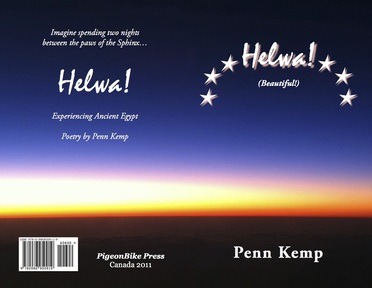 PENN KEMP'S MOST RECENT BOOK Helwa!, PigeonBike Press, 2011 Description PigeonBike Press has launched Penn Kemp's chapbook of Helwa! alongside the release by Pendas Production of Penn Kemp's CD, Night Vision, which includes Helwa!. Since her first book was published by Coach House Press in 1972, she has been pushing textual and aural boundaries, often in participatory performance work. Many of her recent CDs are what Penn terms "Sound Operas": poetic narratives that weave sound, imagery and music in the counterpoint of many voices. Working across a variety of cultural practices to engage her audience, she hosts an eclectic literary show, Gathering Voices, archived on CHRW. Having performed in festivals around the world, most recently in Britain, Brazil and India, Penn lives in London Canada, where she edits poetry for Pendas Productions, a small poetry publisher she and husband Gavin Stairs run. Penn has been heralded by the Writers’ Union as a “one woman literary industry”. BETWEEN BETWEEN Between Between is a short film that concerns the process of mourning, translating some of Penn Kemp's performance poetry into visual imagery for a compelling, evocative portrayal of that state. Between Between examines the experience both of the mourner and (perhaps) of the newly dead. A Penn Kemp and Dennis Siren collaboration.
Kathryn Mockler is the publisher of The Rusty Toque. 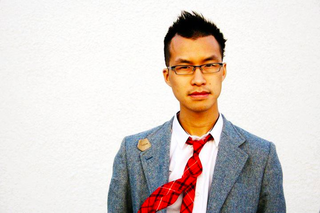 Ray Hsu Photo by Clare Yow Dr. Ray Hsu is co-founder of the Art Song Lab, an interdisciplinary platform that partners 24 writers and composers to create fusions in the genre of art song alongside performers. While completing his Ph.D. at the University of Wisconsin-Madison, he taught for two years in a US prison, where he founded the Prison Writing Workshop. The Workshop brings campus-based writers to the prison to write alongside incarcerated writers in a writers’ studio environment and mentors incarcerated writers writing towards their High-School Equivalency Diplomas. Dr. Hsu is the author of two award-winning books and writing in over fifty publications internationally. His work has been set to music and adapted for film. In addition to teaching and consulting, he has been interviewed for television, radio, and print media as UBC Expert in youth trends, popular culture, and diversity. RUSTY TALK WITH RAY HSU Kathryn Mockler: What is your first memory of being creative or writing creatively? Ray Hsu: In grade 2 we had to make a book. I wrapped corrugated cardboard in felt for the covers. For the plot I ripped off the storyline for Omega Race: KM: Why did you become a poet? RH: They seemed to be having so much more fun than novelists, or at least I thought so as an undergrad. KM: Could you describe your writing process? RH: I barely write at all. Or the poems write themselves, if by poems you mean taking screen capture videos of me playing Diablo 3 in which I play a barbarian named "Poem." KM: Do you have any advice on how to help new writers prepare to read or perform their work to an audience and/or to best engage an audience? RH: The best thing to do is to not look over everyone's heads. Folks who do that prolly heard once that they should make "eye contact," so instead they look over everyone's heads. It's even more distracting than burying one's face in the page. Once a friend kept looking over everyone's head while I was in the audience. My friends and students were trying to nudge me awake as subtly as they could. I call this piece, "The Critic." KM: What writers or poets would you recommended to an aspiring writers? Or what writers were influential to you when you first started out? RH: Anne Carson. Carleton Wilson. Al Moritz. Michael Ondaatje. Carleton Wilson. KM: Could you discuss your interest in activism, collaboration, and experimentation and how these have influenced your artistic practise? RH: A former member of the Weather Underground once said that the difference between being an activist and being an organizer is that organizing involves a whole lot of people whereas activism does not necessarily involve a lot of people. Collaboration, which involves at least one other person, is appealing because I bore myself. I like to organize with my audiences. Or call them participants. KM: Your funniest literary moment. RH: This: ...may be funny in a different way from this: KM: What are you working on now? RH: Laying siege to the idea of "Asian Canadian culture" through this here print magazine: 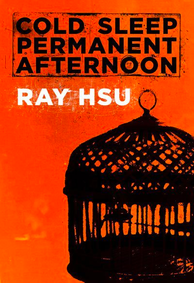 RAY HSU'S MOST RECENT BOOK Cold Sleep Permanent Afternoon, Harbour Publishing, 2010 Description from the publisher Cold Sleep Permanent Afternoon, the follow-up to Ray Hsu’s award-winning first collection, Anthropy, is the second book in a prospective trilogy that explores the “grammar of personhood.” 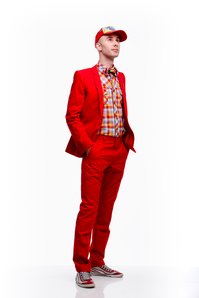 Michael V. Smith Michael V. SmithPhoto by David Ellingsen Michael V. Smith is a writer, comedian, filmmaker, performance artist and occasional clown teaching creative writing in the interdisciplinary program of the Faculty of Creative and Critical Studies at UBC's Okanagan campus in BC's Interior. He is the author of the novels Progress (Cormorant Books 2011) and Cumberland (Cormorant Books, 2002) which was nominated for the Amazon/Books in Canada First Novel Award. In recent years, Smith won Vancouver's Community Hero of the Year Award and the inaugural Dayne Ogilvie Award for Emerging Gay Writers. He's also won a Western Magazine Award for Fiction, scooped two short film prize categories at Toronto's Inside Out festival, and was nominated for the Journey Prize. His videos have played around the world, in cities such as Milan, Dublin, Turin, London, New York, Toronto, Paris, Geneva, Berlin, Glasgow, Lisbon, Beirut, Amsterdam, Copenhagen, Buenos Aires, SF, LA and Bombay. Smith is an MFA grad from UBC’s Creative Writing program. Vancouver Magazine has considered him one of its city's 25 most influential gay citizens whereas Loop Magazine named him one of Vancouver’s Most Dangerous People... His first book of poetry is What You Can’t Have (Signature Editions, 2006), short-listed for the ReLit Prize. In 2008, he published a hybrid book of concrete poems/photographs, Body of Text (BookThug), created with David Ellingsen. RUSTY TALK WITH MICHAEL V. SMITH Kathryn Mockler: What keeps you going as a writer? Michael V. Smith: I’ve always loved a puzzle. My novels have felt like long complicated puzzles that I tried to figure out. Really, every book is a mystery novel, right? You read to the end to find out the whodunnit, in whatever shape that takes. How is this book going to end? Even, how is the poem going to end? How does it work? So writing is the best way to enjoy making puzzles (long ones like novels, short ones like a poem) and still get paid. Okay, I use teaching to get paid. What keeps me going is a fine alchemy of things. There are many pleasures in creating: simple ego-stroking, the thrill of feeling like I’m discovering something, a satisfaction in accomplishment, being generous with myself, the feeling that I’m creating a conversation with someone about a collection of ideas (or characters) I’m very fond of, and the pleasure that comes from being engaged with the world. I’ve never thought of writing as a solitary act. I don’t know where that idea comes from. Writing is a very long one-sided conversation, but I’m always aware that eventually an audience will hear it, and listen, and join in. Kathryn Mockler: What is the revision process like for you? Michael V. Smith: With novels, after I have a first draft, I take out all the parts of the flab that aren’t plot. Just cut it all away. If there are bits of information I particularly like, or can’t do without, then I find somewhere to slip that back in. Usually, that first draft, cleaned up, is a solid skeleton. Then I do drafts that look at fixing specific things: I go through the whole manuscript, for example, and look at tying the events more closely together, so that one event is the cause of what comes next, or I do an edit to ‘psychologize’ the characters, meaning I add in some of the unwritten emotional life of the character, or flush out a bit of background, to fill out our sense of character. It’s a great way to edit for me, because it gives me focus on a particular skill. I always do other work at the same time, of course. One type of change triggers five others. But if I’m just approaching the novel as a whole, it’s overwhelming, and hard to see it clearly, so I love going in there with a tool in hand and digging around, which makes the whole process more manageable. Kathryn Mockler: How did you deal with rejection when you first started out? Michael V. Smith: Rejection is all part of the business, so if you aren’t rejected, you aren’t in the business. I take rejections as a good sign—I’m being a writer. Kathryn Mockler: What are you working on now? Michael V. Smith: I'm working on two projects: a series of tribute videos to friends and family who are ill, and a collection of essays titled Men. 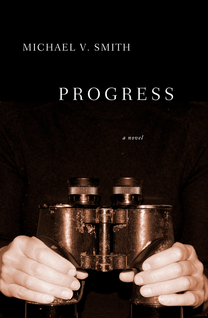 MICHAEL V. SMITH'S MOST RECENT NOVEL Progress, Cormorant Books, 2011 Description Since her fiancé’s death at eighteen, Helen Massey has spent her life avoiding it. Change comes when her town is only months away from being thirty feet under water. A government agency, The Power Authority, is relocating the entirety of her hometown to make way for a power dam project. What can’t be moved will be torn down. Even the cemetery is to be dug up and reinterred nearby. While visiting her lover’s grave, Helen witnesses a man fall to his death on the power dam worksite. “He fell like a sack, straight down, with one arm waving in circles. He fell past the other workman strapped into a harness who must have been surprised to see him pass. Mocking the air. It seemed he fell without a sound.” That same day, her brother returns unannounced after a fifteen-year absence. Robert Massey was a runaway. The construction made his homecoming a “now or never” decision, he tells his sister. “I didn’t want to have to come back in a boat to see the family home.” When Robert discovers his parents kept the reasons for his departure a secret—too little has changed—he confesses, hoping his sister might bury the past. So begins their transformations. The siblings must negotiate their shared history, and their differences, if they are to find themselves a future. In his essay, "A Memoir of Progress," Matthew Rader offers a brief memoir about his experiences with Michael V. Smith's latest novel Progress. This essay is published by AngelHousePress. Read an excerpt of Cumberland. For more information about Michael V. Smith go to his website. 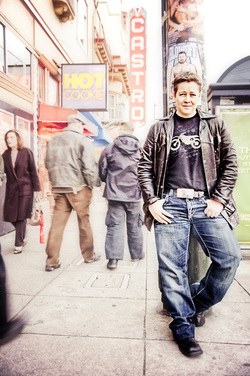 Ivan E. Coyote Ivan E. CoyotePhoto by Eric Nielson Ivan Coyote was born and raised in Whitehorse, Yukon Territory. An award-winning author of seven collections of short stories, one novel, three CD’s, four short films, the editor of an anthology, and a renowned performer, Coyote's first love is live storytelling, and over the last eighteen years they have become an audience favourite at music, poetry, spoken word and writer's festivals from Anchorage to Amsterdam. The Globe and Mail called Coyote "a natural-born storyteller" and Ottawa X Press said "Coyote is to CanLit what k.d. lang is to country music: a beautifully odd fixture." Their column, Loose End has appeared monthly in Xtra West magazine for eleven years. Coyote's first novel, Bow Grip, was awarded the Relit award for best fiction and named by the American Library Association as a Stonewall honor book in literature, and is in development to be made into a feature length film. Their new collection of short stories, Missed Her, was released in September, 2010. Coyote also recently co-edited Persistence: All Ways Butch and Femme with Zena Sharman. Coyote’s latest short story collection, One In Every Crowd, a young adult collection of stories compiled for queer high school kids, was released in April 2012. RUSTY TALK WITH IVAN COYOTE Sara Jane Strickland: What is your first memory of being creative? Ivan Coyote: I am not sure if I have a memory of this or not, or if I feel like I remember it because there is an old old photo of me doing this, but I have a memory of setting up pots and pans like a drum kit on the front deck of my parent's first house and playing the drums on them. I would have been about two or three. SJS: How would you describe your writing process? IC: Deadline driven. I set or get goals and dates, and I try to follow them. I have thousand word days. I make myself write a thousand words, good or bad, not perfect words, just out there. Out of my head and onto the page. Also I make lists of scenes or chapters or stories or ideas and then I just try to write them and cross them off. SJS: What are you working on right now? IC: A novel and a survival guide for tomboys. Also two live shows, both collaborations with musicians. SJS: What is the revision process like for you? IC: I just grin and bear it. SJS: What influences your writing the most? IC: Life. Other books. Other writers. The sky. The weather. How much I have been to the gym lately. Music. Dance. Painting. Movies. Things I overhear on the bus. Kids I meet. People I meet. Loved ones. Loved ones dying. New ones being born. Life. SJS: How did you deal with rejection when you first started out? IC: The first book I was a part of writing, we got asked by the publisher for a manuscript, so I have an unusual story. I didn't have to deal with a lot of rejection right out of the gate. SJS: What keeps you going as a writer or why do you write? IC: I write because I love it more than anything else in my life. I write because I don't know or remember how to be anything else anymore. I write to pay the bills. I write to change the world. I write because I have a deadline. I write because not writing is no longer an option for me. I write because it is the only way to navigate this life, for me. SJS: What is the best thing about being a writer and the worst thing? IC: The best thing? Working alone from home with no pants on. The worst thing? Working alone from home with no pants on. 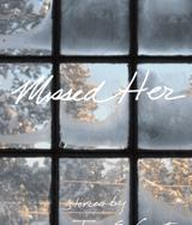 IVAN COYOTE'S LATEST SHORT FICTION COLLECTION Missed Her, Arsenal Pulp Press, 2010 Description from Arsenal Pulp Press: Ivan E. Coyote is a master storyteller and performer; their beautiful, funny stories about growing up queer in the Canadian north and living out loud on Canada's west coast have attracted big audiences, whether gay, straight, trans, or otherwise. In their passionate and humorous new collection, Ivan takes readers on an intimate journey, both literal and figurative, through the experiences of their life: from their year spent in eastern Canada, to their return to the west coast, to travels in between. Whether discussing the politics of being butch with a pet lapdog, befriending an effeminate young man at a gay camp, or revisiting a forty-year-old heartbreak around her grandmother's kitchen table, Ivan traverses love, gender, and identity with a wistful, perceptive eye and a warmth that's as embracing and powerful as Ivan themself. Reviews What happens when a woman with "dykey clothes" confronts a man with a bushy beard about the lesbian book he's reading? Is life easier for a butch or a lipstick lesbian? Is it better to be queer in Whitehorse, where you're subjected to direct questions, or in Vancouver, where PC politeness masks embarrassed confusion? Missed Her, a collection by Vancouver writer and performer Ivan E. Coyote, conveys these lifestyle collisions with thoughtful humour ... Thematically, Coyote's writing has grown in complexity and depth. --Rabble.ca These vignettes read as though they've been freshly torn from a wanderer's notebook, where they were immediately jotted down so as not to lose the vibrancy of the experience. The result is refreshing and tearfully real--Coyote has a gift for blending the tragic and comic in a way that renders a reader gobsmacked ...The writing in Missed Her is direct yet lyrical, poetic yet unadorned, reaching simultaneously for the heart and the gut with brevity and power. --Quill & Quire (STARRED REVIEW) Read More |
Rusty Talk
Rusty Talk Editor: Archives
November 2017
Categories
All
|

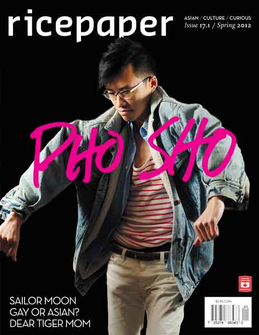
 RSS Feed
RSS Feed
